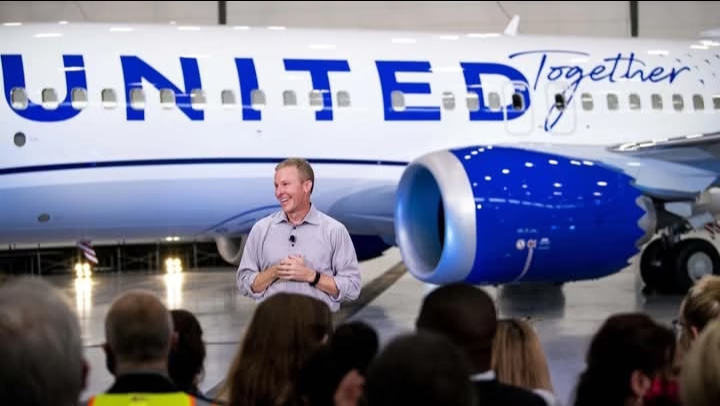In a significant development that has captured the attention of the business world, United Airlines CEO Scott Kirby has expressed measured praise for President Donald Trump’s newly announced tariff policy during a recent event held in the White House Rose Garden. The tariff plan, labeled as “Liberation Day,” is set to impose a 10% baseline tariff on all imports, with higher rates for specific countries, effectively taking effect on April 9, 2025. Kirby acknowledged the intentions behind Trump’s policy, calling them “laudable,” while also highlighting some potential economic concerns.
During the announcement, Trump outlined the primary objectives of the tariff policy, emphasizing a commitment to revitalizing American industries, protecting domestic jobs, and reducing dependency on foreign manufacturing. This approach has resonated with various sectors, particularly among those who feel that American manufacturers have been undermined by international competition over the years. In his remarks, Kirby reiterated that he recognized the importance of supporting local businesses and promoting economic independence.
However, Kirby’s praise of the tariff policy did not come without caution. The United Airlines CEO articulated the potential challenges that could arise from such trade measures, particularly concerning increased operational costs, inflation, and ripple effects across global supply chains. He pointed out that while the motivation behind the tariffs aligns with a desire to strengthen the U.S. economy, the airline industry—like many others—relies heavily on global trade relationships. A sudden shift in tariff structures could lead to disruptions in supply chains, impacting everything from aircraft parts to consumer goods that are essential for day-to-day operations.
Airlines, being part of a global network, face unique challenges when it comes to tariffs. While some argue that tariffs can protect domestic industries, others contend that they may ultimately lead to higher prices for consumers. As United Airlines navigates through a post-pandemic recovery, Kirby’s concerns reflect a broader unease in the industry regarding how tariffs could affect ticket prices and the overall affordability of air travel.
Scott Kirby has been a vocal advocate for the need to modernize and adapt the aviation industry for a new economic landscape, particularly in the wake of the COVID-19 pandemic. His acknowledgment of the tariff policy’s intentions signals a recognition of the broader discourse surrounding domestic manufacturing, economic growth, and national security. Similarly, he emphasized that it is imperative for policymakers to consider the balance between protecting U.S. industries and allowing for healthy competition.
In his statement, Kirby also called for a measured approach to implementing the tariff policy, advocating for careful assessment to prevent unintended consequences that could affect not only United Airlines but the airline industry as a whole. He indicated the importance of ensuring that any new policies do not hinder the momentum of recovery that the aviation sector has begun to experience.
As the announcement of Trump’s tariff policy continues to unfold, it sets the stage for ongoing discussions within various sectors of the economy. Leaders in business and industry will be closely monitoring the implementation of these tariffs, weighing the potential benefits against the risks they pose to operational continuity and consumer pricing.
In conclusion, while Kirby praised the objectives of Trump’s tariff policy and acknowledged the desire to support American manufacturers, his concerns regarding potential economic implications underscore the complexities of navigating international trade in a modern economy. The coming years will be pivotal in determining how these tariffs will impact various industries, particularly those as interconnected as the airline sector.
